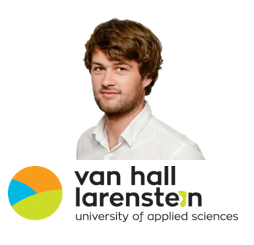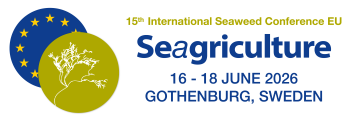First abstract is in! Tom Wijers on the Zeevivo project
University of Applied Sciences VHL, NIOZ, IMARES, Danvos and Hortimare are working together in the ZEEVIVO  (seaweed in fish feed) project. The rapidly growing aquaculture industry is dependent on fishmeal, a key component of fish feed. Fishmeal is produced from wild-caught fish, and this dependence limits the sustainable growth of the aquaculture industry. The fish feed industry is looking for alternative sources of protein; seaweed protein might be a sustainable alternative for fishmeal. In the ZEEVIVO project, research is being done to see if seaweed protein is a suitable fish meal replacer. The focus of this presentation will be on the bio-refinery research of ZEEVIVO. Small scale experiments have been conducted to determine the optimal pH, extraction time, pre-treatment, dilution rate and temperature for the extraction of proteins from seaweed-biomass. With these result the first large scale extraction experiments have been done on batches of 500 kilograms of fresh Ulva lactuca and Saccharina latissima in the spring of 2016. The seaweed was washed, chopped and dissolved in a liquid medium. Subsequently, the remaining solids were separated from the liquid and with the help of membrane filtration the extracted proteins were purified and concentrated. Protein content, amino acid composition and protein functionality were measured to assess the bio-refinery process. Growth experiments on rainbow trout (Oncorhynchus mykiss) will be conducted in the coming years, to test if the produced protein is a suitable fish meal replacer. After completion of the ZEEVIVO project it is known which seaweed species and bio-refinery method result in the optimal raw material for fish feed. The ZEEVIVO project may have a global impact on our feed and food supply and aims to bring a sustainable aquaculture sector one step closer.
(seaweed in fish feed) project. The rapidly growing aquaculture industry is dependent on fishmeal, a key component of fish feed. Fishmeal is produced from wild-caught fish, and this dependence limits the sustainable growth of the aquaculture industry. The fish feed industry is looking for alternative sources of protein; seaweed protein might be a sustainable alternative for fishmeal. In the ZEEVIVO project, research is being done to see if seaweed protein is a suitable fish meal replacer. The focus of this presentation will be on the bio-refinery research of ZEEVIVO. Small scale experiments have been conducted to determine the optimal pH, extraction time, pre-treatment, dilution rate and temperature for the extraction of proteins from seaweed-biomass. With these result the first large scale extraction experiments have been done on batches of 500 kilograms of fresh Ulva lactuca and Saccharina latissima in the spring of 2016. The seaweed was washed, chopped and dissolved in a liquid medium. Subsequently, the remaining solids were separated from the liquid and with the help of membrane filtration the extracted proteins were purified and concentrated. Protein content, amino acid composition and protein functionality were measured to assess the bio-refinery process. Growth experiments on rainbow trout (Oncorhynchus mykiss) will be conducted in the coming years, to test if the produced protein is a suitable fish meal replacer. After completion of the ZEEVIVO project it is known which seaweed species and bio-refinery method result in the optimal raw material for fish feed. The ZEEVIVO project may have a global impact on our feed and food supply and aims to bring a sustainable aquaculture sector one step closer.
About the author: Tom Wijers is an enthousiastic marine biologist with expierence in aquatic biomass cultivation and biorefinary. After finishing his masters at the university of Groningen in 2013 he worked as a microalgae specialist for a company named Omega Green. Here he worked on a cost-efficient closed bioreactor for the culture of microalgae. In oktober 2015 he started at University of Applied Sciences Van Hall Larenstein as researcher, working for the ZEEVIVO project. Tom’s focus is on the extraction and purification of proteins from seaweed.
